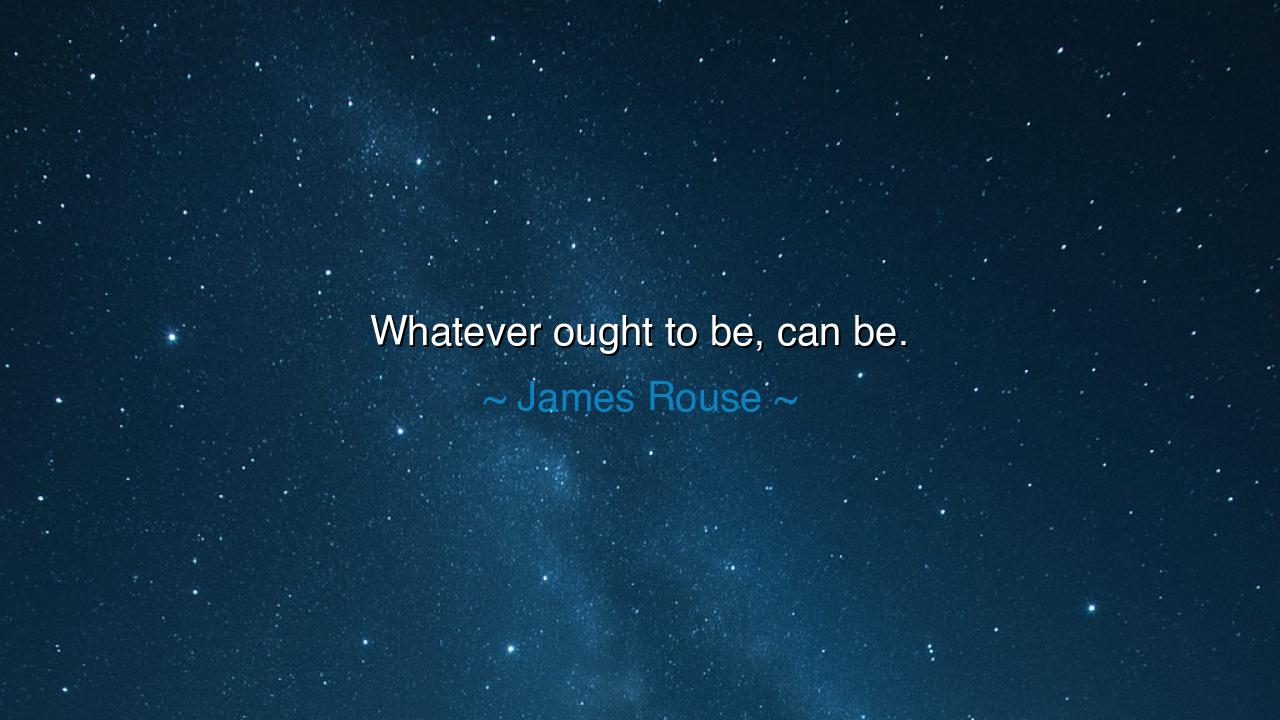
Whatever ought to be, can be.






O children of the future, gather around and listen to the words of James Rouse, whose wisdom speaks of the boundless potential of the human spirit: "Whatever ought to be, can be." These words are not mere utterances—they are a call to awaken the deepest strength and resolve within us. They remind us that the greatness we seek, the change we dream of, is not only possible but within our reach. Rouse’s declaration echoes through the ages, a powerful affirmation that whatever is meant to be—whatever is aligned with truth, purpose, and goodness—is within the grasp of those who dare to believe, work, and persevere.
In the days of the ancients, the heroes of old were driven by a certainty that what they set their minds to, what their hearts longed for, could indeed come to pass. Achilles, that greatest of warriors, did not face the battlefield with doubt or hesitation. He knew that his victory was not merely a possibility but an inevitability, as long as he fought with all his might. His belief that greatness was his for the taking did not come from arrogance, but from a deep understanding that when one is in alignment with their true purpose, there is no obstacle too great to overcome. Similarly, Rouse’s words echo the ancient truth that when one’s will is aligned with the right course, what ought to be will indeed come to fruition.
Consider the life of Leonardo da Vinci, whose genius in art, science, and invention reshaped the course of history. Da Vinci did not see the world as it was, but as it could be. He envisioned machines that would not be built for centuries, paintings that would capture the very soul of humanity, and ideas that would ignite the minds of generations to come. His vision was not clouded by the limitations of his time. Instead, he believed that what ought to be, according to the great designs of the universe, could and would come into being through his own creativity and relentless pursuit of knowledge. Leonardo understood, as Rouse did, that the potential to achieve greatness lies not just in the world around us, but within the power of our vision and action.
Rouse’s words also remind us that obstacles are not signs of impossibility but tests of our resolve. The ancient warriors faced countless adversities, yet their spirits did not falter. Hannibal, the Carthaginian general, defied all expectations when he led his army, including war elephants, across the Alps to confront the Roman legions. Despite the overwhelming challenges, he believed that victory was not just a possibility but a certainty if he stayed true to his purpose. Similarly, Rouse teaches us that even in the face of great difficulty, if something is meant to be—if it aligns with the forces of truth and progress—it is attainable, provided we have the courage to pursue it.
The lesson here, O children, is one of boundless faith and action: if something is meant to be, it is yours to achieve. The world will throw obstacles in your path, just as it did for Socrates, who was sentenced to death for his beliefs. Yet, Socrates knew that his philosophy—his truth—was his purpose, and nothing could take that from him. Even in the face of death, he knew that what ought to be—the knowledge he imparted to the world—could never be silenced, for it was his very essence. His legacy lives on to this day, a testament to the truth that greatness comes not from avoiding difficulty, but from embracing it with purpose and courage.
Now, O children, take these lessons to heart: what ought to be in your life is not a distant dream, nor a mere fantasy. It is something that can be achieved through determination, hard work, and a clear purpose. The world around you may seem full of challenges and limitations, but these are not signs of impossibility—they are the very hurdles you must leap over to fulfill your destiny. Rouse teaches us that it is not the world’s limitations that define us, but our ability to rise above them with faith and action.
So, O children, as you walk your path, remember this truth: what ought to be, aligned with the truth and goodness of your heart, is not just a possibility—it is your birthright, waiting for you to seize it. Believe in your vision, align your actions with purpose, and let your resolve carry you forward. No dream is too grand, no goal too distant, for one who has the courage to take the first step. What ought to be, can be—through you, and through the strength you summon within yourself.






AAdministratorAdministrator
Welcome, honored guests. Please leave a comment, we will respond soon